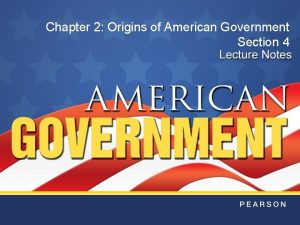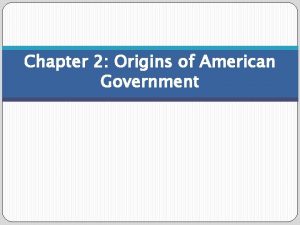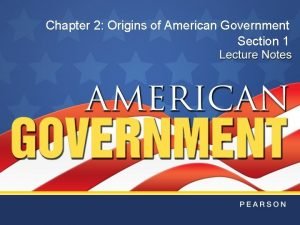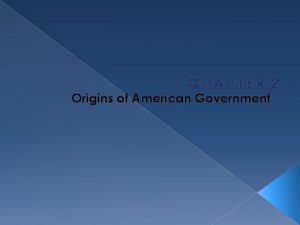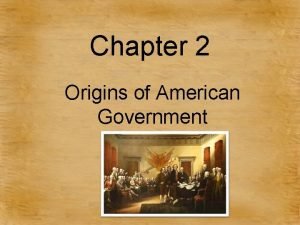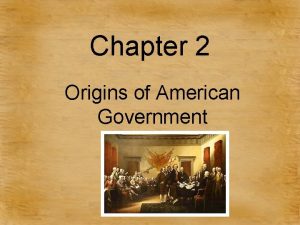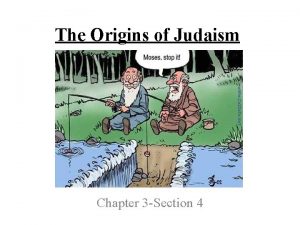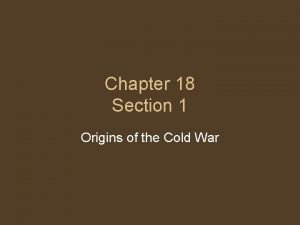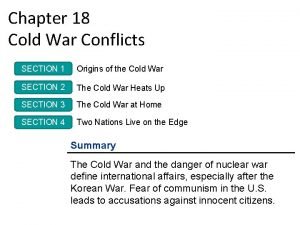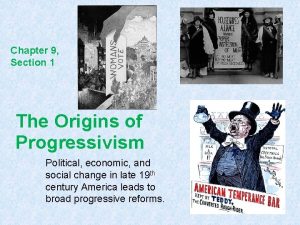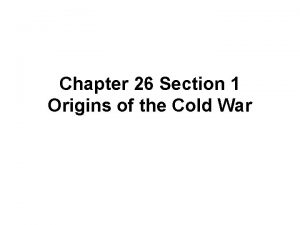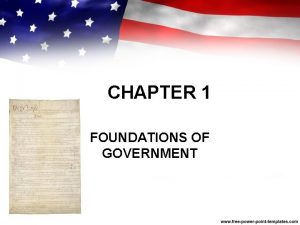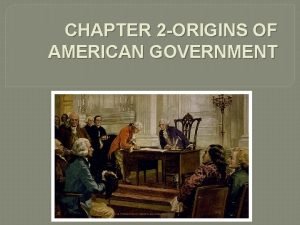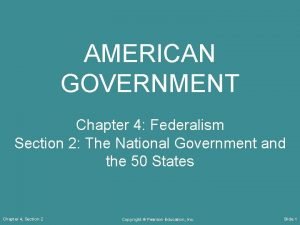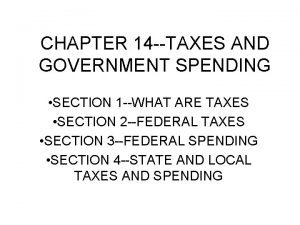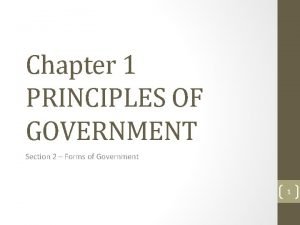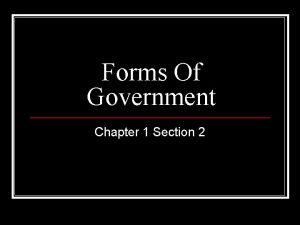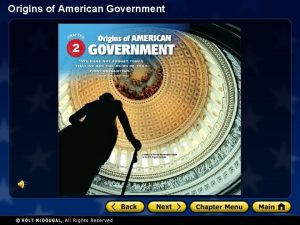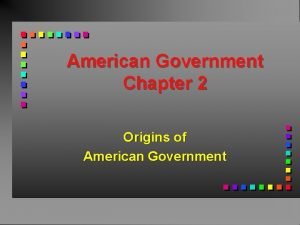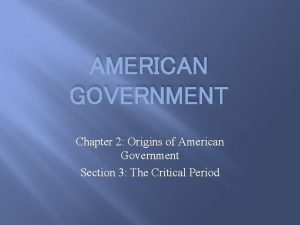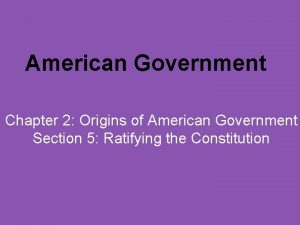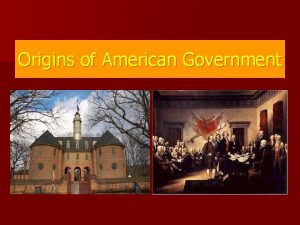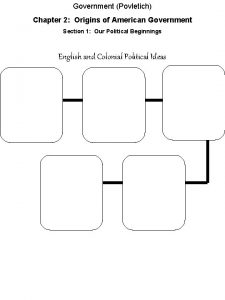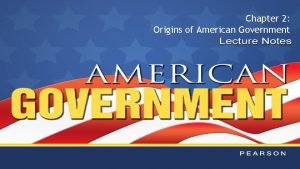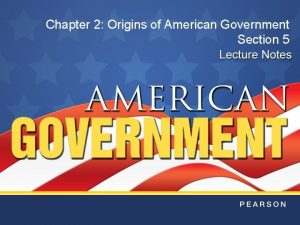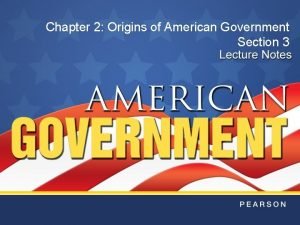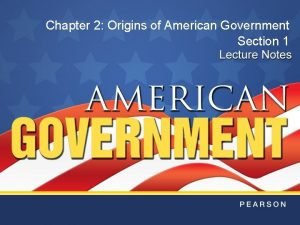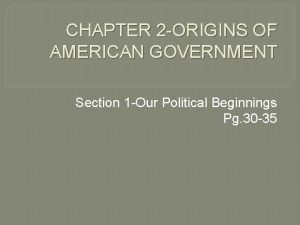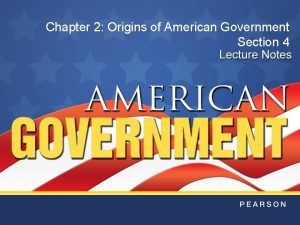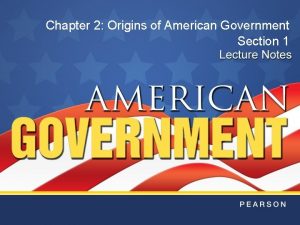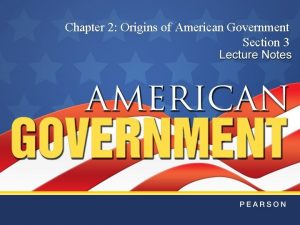Chapter 2 Origins of American Government Section 2




















- Slides: 20

Chapter 2 Origins of American Government Section 2 Moving toward Independence

Colonial Dependence on Britain Ø At first, the colonies and Britain had a close relationship: • British corporations offered financial support to the colonies. • The British army and navy provided military protection to the colonies. • The colonies exported agricultural products to Britain. Ø As time went on, the colonists developed an identity as Americans. © EMC Publishing, LLC

Britain Gradually Dominates the New World in the 1700 s © EMC Publishing, LLC

Political Developments Ø Britain financed and won the French and Indian War, which ended in 1763. Ø Britain forced the colonists to pay the war debt, by enforcing strict trade laws and taxes. Angered the colonists. Ø Angry colonists wondered, “Do we really need the protection of the British? ” Ø Believed in popular sovereignty. People rule and have ultimate authority. © EMC Publishing, LLC

Colonial Unity versus Loyalty to Crown Colonial Unity Ø Colonists strengthened colonial ties through: • The 1754 Albany Plan of Union: Was written by Benjamin Franklin • Delegates from each colony gather annually to act on military and economic issues. • Rejected by British • The 1764 Stamp Act Congress: Protested the Sugar Act and was the first colonial union against Britain • Stamp Act repealed by British a year later. © EMC Publishing, LLC

Colonial Unity versus Loyalty to Crown Ø Committees of Correspondence helped unify the colonies against Britain by: • by spreading examples of widespread resistance • Can make it look more widespread by using a few examples • by enlisting ordinary citizens in the cause of revolution • by generating sympathy for fellow Americans in other colonies © EMC Publishing, LLC

Colonial Unity versus Loyalty to Crown Ø Colonists accepted British power over them if: • They were involved in British administration • They had commercial ties to Britain • They wanted military protection • They were committed to idea of monarchy © EMC Publishing, LLC

Colonial Legislation and Divisive Events Ø 1764 Sugar Act: Taxed sugar and increased costs of coffee, indigo, and wine Ø 1765 Stamp Act: Taxed printed materials • Stamp Act Congress succeeded in overturning British stamp tax law without the use of violence Ø 1767 Townshend Acts: Taxed glass, lead, paints, paper, and tea; allowed government to seize private property and issue general search warrants Ø 1770 Boston Massacre: Ended with British soldiers killing several colonists Ø 1773 Boston Tea Party: Colonists showed displeasure with the Tea Act by dumping tea into Boston Harbor • Rebellious tactics used by the “Sons of Liberty. ”

Struggle for Power Ø Not so much a fight over money as much as it was the control of money. Ø Colonists were doing fine financially. • Comparatively to English citizens Ø Colonists wanted the power to rule themselves. Ø Didn’t like the King across the ocean controlling them. © EMC Publishing, LLC

Slavery Ø Preferred gradual rather than immediate Ø “I wish from my soul that the legislature of this State could see the policy of a gradual abolition of slavery. ” George Washington Ø First step in gradual emancipation was stopping the importation of slaves © EMC Publishing, LLC

Slavery Ø Slavery is an example of one of the issues. Ø What do you think the issue was? Ø In 1771, Massachusetts Assembly • End Slave Trade • Governor rejected Bill Ø In 1772, Virginia (leader in Civil War) House of Burgesses • • Request to the King “Trade of great Inhumanity. ” King disallowed Many more attempts © EMC Publishing, LLC

Benjamin Franklin Ø “. . . a disposition to abolish slavery prevails in North America, that many of Pennsylvanians have set their slaves at liberty, and that even the Virginia Assembly have petitioned the King for permission to make a law for preventing the importation of more into that colony. This request, however, will probably not be granted as their former laws of that kind have always been repealed. ” -1773 © EMC Publishing, LLC

Colonist Responses Ø British laws led to colonial unity. Ø The First Continental Congress, 1774: • Declared the Coercive Acts void Ø Second Continental Congress, 1775: American government during and immediately after the Revolutionary War • Established a national government • Led to the writing of the Declaration of Independence • John Hancock was it’s president © EMC Publishing, LLC

Your Turn How reasonable were British taxes on the colonists? Rank the following taxes in the order of how reasonable you think they were (with 1 being the most reasonable). Be prepared to explain your ranking. a. Sugar Act (1764) b. Stamp Act (1765) c. Townshend Acts (1767) © EMC Publishing, LLC

Thomas Paine’s “Common Sense” Pamphlet Ø Was published in January 1776 Ø Used simple language so illiterate colonists could understand it Ø Was instrumental in turning public opinion Ø Was distributed in over 150, 000 copies © EMC Publishing, LLC

“Common Sense” Ø “Men of passive tempers look somewhat lightly over the offences of Britain, and…are apt to call out, ‘Come, come, we shall be friends again for all this. ’ But…tell me, whether you can hereafter love, honour, and faithfully serve the power that hath carried fire and sword into your land? If you…can still shake hands with the murderers, then you are unworthy of the name of husband, father, friend, or lover, and…you have the heart of a coward…” © EMC Publishing, LLC

The Declaration of Independence Ø Written by Thomas Jefferson (influenced by John Locke’s social contract theory)- 1776 Ø Written to: • Justify colonies’ revolt to other nations • Convince wary colonists to join the rebellion • List grievances against George III, king of England • Persuade others that the colonists were right (Framers wanted to justify only this revolution, not other rebellions. ) Thomas Jefferson feared colonists would justify individual states rebelling. © EMC Publishing, LLC

The Declaration of Independence “When in the Course of human events, it becomes necessary for one people to dissolve the political bands which have connected them with another, and to assume among the Powers of the earth, the separate and equal station to which the Laws of Nature and of Nature’s God entitle them… …when a long train of abuses and usurpations, pursuing invariably the same Object, evinces a design to reduce them under absolute Despotism, it is their right, it is their duty, to throw off such Government. ” © EMC Publishing, LLC

Meaning of Equality Ø African Americans • Declaring Independence for colonists challenged the idea of slavery. What about slaves independence? • Blacks in the army • Things would get better in the North after the War but get horribly worse in the South. Ø Native Americans • Europeans thought of them as simple, inferior people. • Not prospective citizens • Pushed farther and farther west © EMC Publishing, LLC

Meaning of Equality Ø Women • Involved in the war effort • Took step back after the war • Political Roles limited because they were “too good”- symbols of peace, serenity, and moral happiness rather than political dissension. • Even women with property were prohibited from voting. Ø Who did benefit from the Revolution? • Large landowners © EMC Publishing, LLC
 Origins of american government section 4
Origins of american government section 4 Origins of american government section 1
Origins of american government section 1 Origins of american government section 1
Origins of american government section 1 Chapter 2 origins of american government vocabulary
Chapter 2 origins of american government vocabulary Chapter 2 origins of american government answer key
Chapter 2 origins of american government answer key Chapter 2 origins of american government worksheet answers
Chapter 2 origins of american government worksheet answers Chapter 2 lesson 1 government in colonial america answers
Chapter 2 lesson 1 government in colonial america answers Chapter 2 origins of american government
Chapter 2 origins of american government Chapter 3 section 4 the origins of judaism
Chapter 3 section 4 the origins of judaism Origins of the cold war chapter 18 section 1
Origins of the cold war chapter 18 section 1 Origins of the cold war chapter 18 section 1
Origins of the cold war chapter 18 section 1 The origins of progressivism chapter 9 section 1
The origins of progressivism chapter 9 section 1 Chapter 26 section 1 origins of the cold war
Chapter 26 section 1 origins of the cold war Foundations of government guided reading activity section 1
Foundations of government guided reading activity section 1 Chapter 2 american government
Chapter 2 american government American government chapter 4
American government chapter 4 Chapter 14: taxes and government spending section 1
Chapter 14: taxes and government spending section 1 Chapter one principles of government
Chapter one principles of government Chapter 1 principles of government
Chapter 1 principles of government Chapter 1 section 2 forms of government
Chapter 1 section 2 forms of government Chapter 15 origins of biological diversity answers
Chapter 15 origins of biological diversity answers
